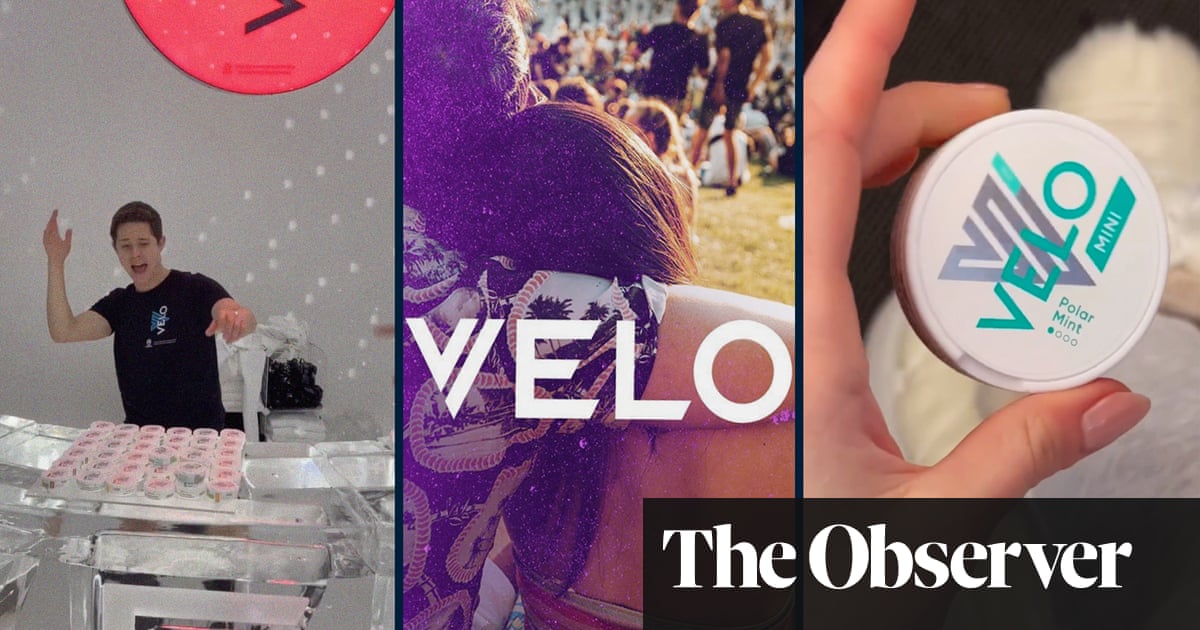
Tobacco companies are exploiting a legal loophole to promote flavoured nicotine pouches as a fun and glamorous lifestyle product, including paying young influencers to plug the products online.
The addictive pouches – sachets of nicotine tucked under the lip – are being pushed in Instagram campaigns, at music festivals and at lavish promo parties, the Observer has found.
Companies are also running prize draws and handing out thousands of free samples to attract new customers in the UK.
The marketing has raised concern among health experts and campaigners, who say firms are able to position the pouches as a “trendy lifestyle product” – rather than presenting them factually as a smoking alternative – because they are largely unregulated.
In the US, the Food and Drug Administration bans sales of all nicotine products to under-21s and prohibits companies from giving out free samples. The Netherlands recently banned nicotine pouches altogether.
But in the UK, unlike e-cigarettes, they are not classed as tobacco-related products and can be legally sold to under-18s. The disposable pouches – which come in various strengths and in flavours such as watermelon, strawberry and mint – can also be legally advertised across social media, where vape promotions are generally prohibited.
The advertising watchdog says promotions must be “responsible” and not targeted directly at children, but statutory restrictions that cover vapes and other age-restricted products also do not apply – meaning price promotions, celebrity endorsements and content that goes “beyond factual information” are not explicitly banned.
Companies pushing nicotine pouches in the UK say that despite the looser rules, their marketing is responsible and their promotions are never targeted at under-18s. They say the pouches, which do not contain tobacco, are a reduced-risk alternative to smoking and are aimed at existing nicotine users.
But Observer analysis suggests the products are being promoted in glamorous marketing campaigns that appear to be aimed at younger audiences – just as the UK government launches a crackdown on e-cigarettes amid concern over youth vaping.
British American Tobacco (BAT) – which makes Pall Mall and Lucky Strike cigarettes and Vuse vapes – frequently works with young British Instagram influencers to promote its nicotine pouch brand, Velo. In March, the company hosted a party with a DJ and free product samples. Attendees, including London rappers in their 20s, later posted event videos featuring Velo products on Instagram.
The firm – which claims to have a 52% share of the UK nicotine pouch market – has also sent influencers on sponsored trips. Several have posted clips of themselves dancing, drinking and posing with nicotine pouches at the Tomorrowland festival in Belgium and the British Grand Prix.
Japan Tobacco International (JTI) has also invested heavily in its UK marketing. The company – maker of Camel and Benson & Hedges cigarettes – has partnered with 12 festivals to promote its Nordic Spirit pouches, including Secret Garden Party, the Isle of Wight festival and Reading and Leeds.
“Ready for the best summer ever? Well ... Never miss a moment with @nordicspirit_uk,” one ad, posted recently by a festival partner, says. JTI is also running online prize draws giving away free bar tabs and event tickets.
Professor Agnes Nairn, an expert in issues relating to marketing and young people at the University of Bristol, said the companies were “advertising fun”. “What the stuff is saying is, ‘This is a hell of a lot of fun.’ It just creates this incredibly positive feeling about your product,” she said.
She added that some of those featured in the ads “look young”, but that the ads were likely to be within existing regulations. “The big point is: are the regulations right? And the chances are they probably aren’t.”
Caroline Renzulli, from the Campaign for Tobacco-Free Kids, which tracks advertising by tobacco firms and shared its research with the Observer, said firms were “positioning nicotine pouches as trendy lifestyle brands” but loose regulation meant the marketing was “falling through the cracks”. “What we’re seeing is outrageous. This is an extremely addictive product,” she said.
Action on Smoking and Health, a campaigning charity, said the marketing was “straight out of the big tobacco playbook of old”.
Marketing tactics used by some online retailers have also raised concern. Websites are offering unofficial products modelled on popular sweet and drink brands, including Skittles, Tic Tacs, Mentos and Pepsi, the Observer has found. Many advertise discounts and deals to entice people to buy.
Some of the unofficial products have higher nicotine content than mainstream brands, which typically contain 2mg to 17mg per pouch. One website is offering “extreme” versions with a “whopping” 50mg per pouch, in “delicious” flavours such as bubblegum, strawberry milkshake and banana ice.
The findings have led to calls for nicotine pouch regulation to be brought in line with that of other nicotine products.
Despite the heavy investment in marketing, UK sales remain modest. But figures suggest the category is growing – with the total market for pouches worth £45.8m, up from just £3m in 2020, according to JTI data.
Dr Leonie Brose, reader in nicotine research at King’s College London, said the regulatory “void” meant that while some manufacturers put “18+” on their packaging and ads, retailers “don’t even need to ask for ID” to legally sell nicotine pouches at the moment. “It is a loophole,” she said.
The government has previously been warned about the issue. A report by the Committee on Toxicity into nicotine pouches – prepared last year at the request of officials – raised concerns about the current regulatory framework and warned of the “appeal and ease of availability of oral nicotine pouches to individuals under 18”.
Alice Wiseman, policy lead for addiction at the Association of Directors of Public Health, called on the government to “introduce tighter regulation as a matter of urgency”.
“These products are currently unregulated which leaves children and young people vulnerable,” she said.
The Department of Health said it was aware of the concerns but had no current plans to regulate further. “The use of nicotine pouches remains low in England and while there are no current plans to regulate them any further, we will continue to keep this under review,” it said.
The approach appears at odds with the strategy for tackling youth vaping, which is currently the focus of a government crackdown after figures revealed a rise in underage use. Measures being considered are a ban on flavours and bright packaging.
In April, Rishi Sunak criticised e-cigarette firms that used adverts, colours, characters and flavours that “appeal to kids”. “These are all things that shouldn’t be happening,” he said.
The Advertising Standards Authority said it was reviewing several ads flagged by the Observer to see whether they complied with its code. It said nicotine pouch ads must be “socially responsible” and not directly targeted at children – but that because the products were not age restricted by law, statutory restrictions did not apply. It said it was keeping the issue under review.
Instagram suggested the ads went against its policy; however, several posts promoting Velo and Nordic Spirit were live this weekend. “We don’t allow ads or branded content that promotes tobacco-related products and we’ll continue to remove content that breaks our rules,” it said.
BAT said its marketing for Velo “complied with all applicable laws”, and that it only worked with influencers aged over 25 with a “significant majority” of followers aged over 18. “We have frequently called on the UK government to introduce specific regulation for nicotine pouches,” it said.
JTI said it only marketed Nordic Spirit to “adult smokers, vapers and nicotine consumers” and its products were for use in “situations when smoking or vaping is not possible”.
It said it did not work with influencers who were, or looked, under 25; that it has a “challenge 25” policy for free samples; and that it only uses social platforms where 75% of the audience are over 18. “JTI is fully committed to the principle that minors should never use or access nicotine-containing products,” it said.












